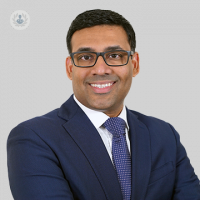What is anxiety?
Autore:There are many psychological disorders that can affect our lives. While anxiety can just be a normal emotion that we feel in response to a difficult or dangerous situation, it can also be a very real problem if we start to feel anxious all the time, or experience extreme bouts of anxiety when the current situation doesn’t call for it. Leading psychiatrist Dr Abrar Hussain is here to reveal the truth about anxiety disorders.

What is anxiety?
Anxiety is a common experience. We tend to feel anxious when we are faced with a threat. It's actually an important mechanism, because anxiety prepares our body to manage the threat either with a fight or flight response.
However, if anxiety persists, the normal anxiety experience becomes an anxiety disorder, which can seriously affect the person’s life. There are different kinds of disorders depending on how the anxiety manifests. The most common is called generalised anxiety disorder, which happens in about six in a hundred people. It's characterised by a sense of general anxiety, free-floating anxiety, a sense of unease and apprehension, and can have a disabling impact on daily life.
The other kind are panic disorders, where patients may experience acute spikes and severe anxiety characterised by psychological and physical symptoms. They might feel that the world is about to end or they're about to die and it can be quite hard to manage.
In my clinical practise, when I explore anxiety disorders, they sometimes lead back to a traumatic point in the person's history. Anxiety that stems from trauma can be quite disabling as well and people can experience flashbacks and nightmares of previous trauma. That condition is called PTSD (post-traumatic stress disorder). Patients may avoid things which remind them of the trauma and can become hyper-aware of their present situations.
There are other less common disorders of anxiety such as social phobia and agoraphobia.
What are the signs and symptoms of anxiety?
Anxiety can manifest in different ways; two people with anxiety disorders can have totally different experiences. Generally speaking, we can think about symptoms in two broad categories.
First of all, there are psychological symptoms, which include feeling anxious, feeling nervous, a sense of apprehension and unease.
There are also a set of physical symptoms, which are mainly due to adrenaline, which is increased in the body at times of anxiety. The physical symptoms include palpitations, shortness of breath, sweating, dry mouth and nausea.
The psychological and physical symptoms can have significant impact on our lives. It can affect home life, work, relationships, and productivity. Sometimes anxiety stems from a past traumatic event. In this case the anxiety symptoms can be quite specific. For instance, people can have flashbacks and nightmares of the traumatic event and may also avoid triggers which remind them of the trauma. In addition, people can feel hyper-anxious and hyper-vigilant which means that they're more aware of what's going on around them and they're easily startled by sounds.
Is there a connection between anxiety and depression?
Anxiety and depression are two separate conditions, although they can have a similar mechanism in the brain. In my clinical practise, I find that there can be an overlap between depression and anxiety. Like I've said before, anxiety can manifest in different ways, and the overlap with depression can make it harder to manage.
It's important to remember that depression is not the same as feeling sad. Feeling sad is a normal experience; it is a normal response to something that we might have lost or something that is troubling us and upsetting us. Depression, on the other hand, is a medical condition. It's a clinical disorder.
Depression is characterised by feeling low in mood, not being able to enjoy things, and feeling easily fatigued. People with depression can also have difficulty with sleep, appetite, and concentration. In addition, if the depression is prolonged, patients may start having difficulties with their relationships and productivity. In some cases, depression also presents with what we call cognitive symptoms. These include a sense of hopelessness, worthlessness, and pessimism. Patients can also experience a sense of guilt and the world can look a lot bleaker and more pessimistic. It's not uncommon for people with depression to experience thoughts of suicide and self-harm.


